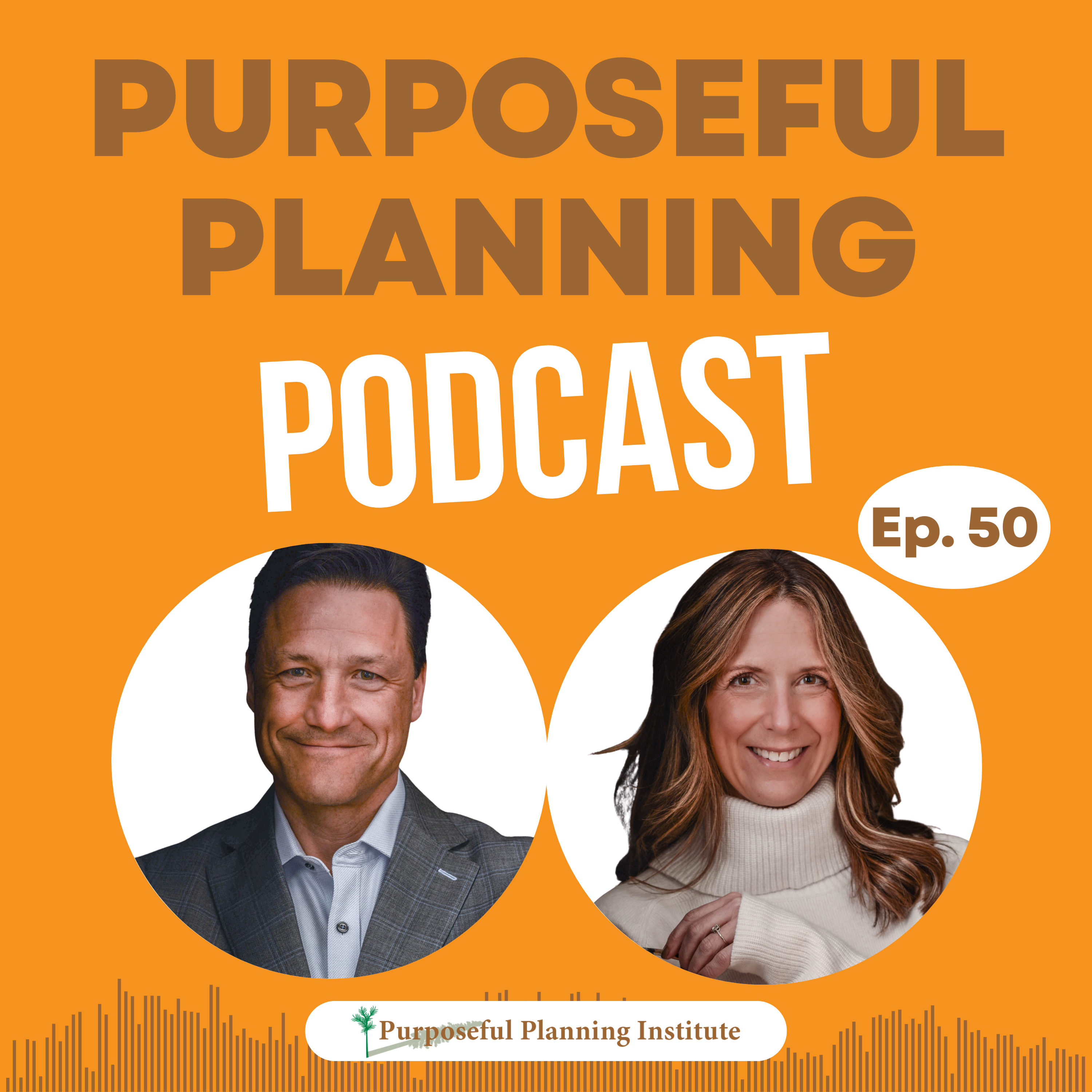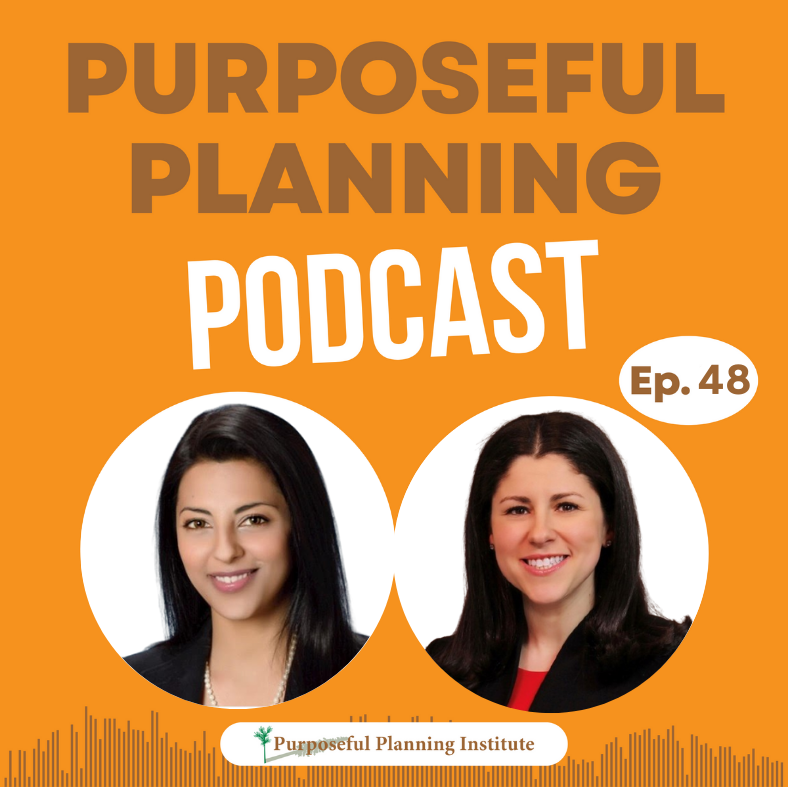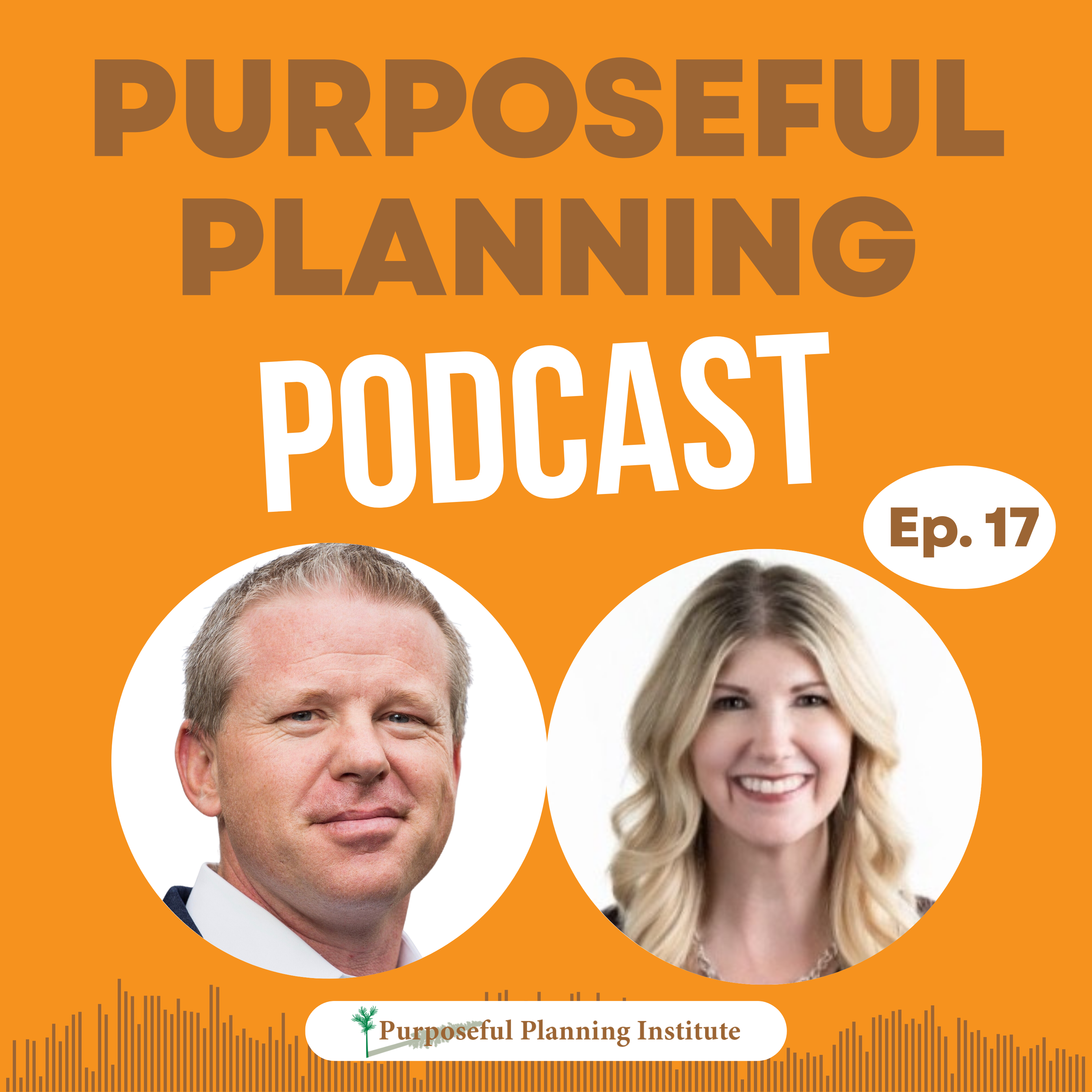Episode Transcript
KIRBY: Welcome to the Purposeful Planning Institute Podcast. I am your host today, Kirby Rosplock, and I'm here with Ian. And we're both going to tell you a lot more about how powerful are your questions. So, this is a really exciting topic, and I'm thrilled to be with Ian today. Why don't we just give a little bit of background about each of us? Ian, do you want to start?
IAN: Sure. I'm Ian McDermott, I'm Dean of Innovation and Learning at PPI. I wear lots of hats. I spent many days training advisors to be more human, and not just to be technicians. And I work with families around the world. I also work with CEOs and organizations. And, invariably, I'm involved in giving people how-to, the tools that make it possible to communicate more effectively. And on that basis, I find myself involved in really fascinating projects, which are rewarding because they result in practical changes in both systems and individuals' lives. And perhaps that's enough for now.
KIRBY: That's great. Ian, I am so excited to be doing this podcast with you today. A little bit about my background, I'm Kirby Rosplock. I'm the Dean of Family Offices at the Purposeful Planning Institute. And like Ian, I work with lots of different individuals, families, family offices and family businesses, through Tamarind Partners with Family Office Consultancy that I'm CEO of, and Tamarind learning, which is our education technology platform to support beneficial owners and family offices and family enterprises. And today, Ian is our featured guest, and we're here to talk a lot more about how powerful are your questions. Ian, I know this was an incredibly provocative chapter that you wrote, “Wealth of Wisdom: Top Practices for Wealthy Families and Their Advisors,” edited by Tom McCullough and Keith Whitaker. And Ian McDermott's chapter is Chapter 47: How powerful are your questions. So, a really fantastic read and super insightful. So I think this is such a powerful discussion for the new year. Can you just tell us more about this chapter and this concept?
IAN: Well, sure, but I think the chapter is just a vehicle. The really interesting thing is understanding how questions work. Because as human beings, there is not a day that goes by when we don't ask questions, either of ourselves or others. But people frequently don't realize that every time you ask a question, be it of yourself or someone else, you're sending somebody on an internal journey. You send them on a search, basically. Now, as far as the brain is concerned, the way you ask the question has an enormous impact, both on the state a person is in. Do they feel good? Do they feel curious? Do they feel bored? There can be a whole bunch of reactions to the question asked. And it also, the way you ask affects what sort of search it is going to be. Is there going to be looking for something that will be in some way useful? Or is it going to be perhaps something which takes you down a rabbit hole that's not so useful? And understanding that different questions send people on different kinds of searches, is the beginning of being able to start using language effectively, rather than just spraying people with questions in a pretty willy nilly sort of way. Now, I could illustrate this, but please, let's just limit it to what comes next for you.
KIRBY: Let's deconstruct this a little bit more and maybe understand these different frames, and why I might say, problem frame versus an outcome frame change what somebody learns in the process of asking a question.
IAN: Sure. So let's be clear about what we mean by frames. When I ask a question, if I just say, “How are you?” It's a pretty open question. If I say, “How are you?” [in a lower tone] That's different. So I've already started to load the question by the tone I use. And very frequently, what happens when we ask questions is we frame people's expectations and perceptions. If I say, “So, what's the problem?” I'm already framing your experience as in some way, just that, a problem. I don't have to do that. I could say, “So, tell me, what are you going for at the moment?” Now that's totally different. And by the way, even when you ask it, your tone sounds different. If I say, “What do you want?” Then I'm starting to talk about something you desire. I don't know, necessarily, much about it, but that's a different journey I send you on internally, and I'm likely to learn different things as a result. So there's an interesting phenomenon here, which is that people very often have almost like knee jerk questioning patterns that are entirely outside their conscious thinking. It's just they default to certain sorts of questions. And that can mean that you send people on the same kinds of journeys, and those may not necessarily be the most useful journeys. So what does that mean? Well, if I'm asking you, “How's it going?” Then it's pretty neutral. But if you say, “Ah, yeah, well, it's going okay. But you know, it's not really how I'd like it to be.” Now, it's slightly different, isn't it? I could say, “Oh, so what's the matter?” And I'll learn more about what's the matter, what's the problem. If I say, “Oh, so what is it you're wanting?” I'm gonna learn something different entirely. The way I ask it, what I ask, the words I use will affect the response you have, because it'll affect the search you go on.
KIRBY: Yeah, well, I love this idea of the question and the search, and the generative nature of what we ask is sort of fortuitous and manifests kind of what direction we're going to go in. I mean, I think about when we walk into a doctor's office, they almost never say, “I feel I'm doing better at this. I feel great at this. This is going well.” That's a great example, or many cases, of where we might be really problem focused, where they're looking for symptoms, ailments, issues, to get to a diagnosis. And that's such a good helpful way to think, or an example of where we might see problem focus. Tell us more about how you're using these frame questions in your practice and how this is helping?
IAN: Well, I think there are many different ways in which this can be really helpful. Let me give you an example from just not my practice, but actually from my own family. I can think of one member of my family who when I've spoken to on the phone for many, many years, we live in different countries. And I'll say to her, “So how are things?” And what will happen is I'll hear the other end of the phone this; [sighs] And then she'll say, “Well, the problem is…” and she's immediately indicating a particular filter that she uses, and she uses it a lot. Now, for me to understand that that's how she sorts her experience is potentially incredibly helpful, because I can actually go and meet her there. If that's where she's at, for me to be able to say, “So, it sounds like this is a bit of a problem.” She can go, “Yeah, it is.” So now we're at the same place. But I don't have to stay there because I can say, “So if I've got this right, so the problem is blah, blah, blah, whatever it is… Okay, that sounds mmm, not so great.” “No.” “Has it been going on for a while?” “Yes, yes, it has. And I didn't know when did it start.” Now I could ask all sorts of questions. But notice the kinds of questions I'm asking: How long have you had it? When did it start? Is there anybody in particular who's responsible for this? These are all questions about what? About causation. If I'm talking about causation, I'm not talking about effect. I'm talking about where does it come from. And if ever you start asking those kinds of questions, you're not just sending someone on a search, you're sending them on a search into the past. You are orientating them in time to the past. And that could be — could be — very useful because they begin to understand, “Oh, this has come from. Okay, yeah.” But at some point, you're probably going to want to shift to, “Okay, so we know enough about where it came from, and how it's not great. So it's not great. So, if you were going to think about what you'd rather have. let me ask you, what would you rather have?” Now, that person's got to start thinking about, “If not this, what?” And as soon as we get into what would you rather have, we're beginning to bridge into something which is not yet present. But it will be in the future, if she knows how to make it happen. So we're moving to questions that are of a different sort. And a very obvious kind of such question would be, “So what do you want?” And that presupposes, “I don't have it? Well, when might I have it? I could have it in the future if I knew how to get it.” And then we go into different kinds of questions about, “Alright. So that's what you want (whatever it is), and how would you know when you've got that?” Now, that is a really powerful question, because very often, people can be wishing and hoping. But what's the proof that they've arrived? And very often people begin to clarify their own thinking by getting more specific. I don't know if you've ever had the experience of maybe you're buying a car or something. And you've decided what kind of car you're going to purchase. Maybe you haven't taken delivery yet. And what happens then, is you can be out and about, maybe you're driving, and you just realize. “My god, the roads are littered with the car I'm going to purchase. Why is that? Has there been a sudden rush in demand for this car?” No. What's actually happening is your brain has now been given a classic phenomenon. Ah, now it pays attention in a different way. There's one, there's one, there's one, and so on.
KIRBY: Yeah, I love it. I love it. I have to say that the questions that we ask are fateful. They can oftentimes influence where we get to, and I love that sort of problem-framed questions might take us back to what it was, what caused it, how it manifests. And your outcome frame might actually help us figure out solutions. Where are we trying to get to? How might this be done better or differently, and sort of an appreciative frame. The New Year is such a great time for these questions. But when I think about any time people are in a transition, or in a change state, or contemplating, they want something more or different than what exists today. You know, tell us more about how the brain can also launch that new journey?
IAN: Well, you mentioned New Year, of course, in a sense, every day is the start of a new year. If you want it. You don't have to just get this special offer that comes on one magic day of the year. And Oh, you missed it. Sorry, you have to wait to the same time next year. You can start any time. But I think one of the things that is going to make a huge difference is being able to ask yourself questions, which actually impact how you feel inside. One of the most interesting things to me about asking questions that frame things in terms of outcomes, (What do you want?) is that sometimes people say, “I don't know.” And I've been in that position where someone has said it and I go, “No, okay. You don't know. Fair enough. But if you did know, what would you say?” And then people proceed to tell me. I's quite astonishing. So you cannot know, and it's okay not to know. You can make something up, because you can always change your mind. But what happens when you start asking outcome questions is you take people into potential futures. And for them — to give you some examples of the kind of questions you can then ask, you might start with something obvious, like, “What do you want?” — “How would you know if you'd got it?” Okay, so now we're really asking for evidence. “Or let you know you're on track?” And we could go from there. I find very frequently, a very useful question is, “What else in your life will improve when you get this?” Now, why is that important? Because most of the things we do do not exist in a vacuum. So, understanding that this could have ripple effects makes people be more aware of the payoffs, which potentially also increases motivation. “Oh, I hadn't realized there's quite a lot that I could get from doing this. You could go on from there to ask people, “So what resources do you already have, which can help you achieve this outcome,” presupposing that there are some resources. What everybody does, and what resources. I mean, somebody said to me recently, and they said it in a very interesting way. They said, “I know this sounds stupid.” So I know, basically, I'm about to be told something important. Their conscious mind can't make any sense of it. But actually the wisdom is there. And they said, “One of the things that immediately popped into my head was a sense of humor, I don't know what that's got to do with that.” Sense of humor is all about keeping things in proportion, understanding that this is not ‘do or die’. And so it gets to be an incredible resource. So you could say, “What resources do you have?” But you can also ask people things like, “What is something similar to this, which you did succeed in doing?” Now, there's a question which takes us back into the past. But it resources us because we're doing what the brain does naturally, namely: we're making associations about that experience when you're learning something new, and you go, “Oh, is this like,” and that's your brain trying to make the connections to map across from previous experiences that are in some way similar; so, “What is something similar, which you did succeed in doing, which may actually make your brain go, “Oh, I could use some of that in this new opportunity that I'm seeking to create?” And then another question, which is a great place to press the pause button would be, “So given all of that, what's the next step? Just a step? What would that be?” And so it becomes manageable. I could take a step in that direction. And the really fascinating thing for me about all of this is when you ask those kinds of questions, if you have rapport, the person actually feels different. Invariably, people tell me, you know, I feel different in myself about this, it seems more possible.
KIRBY: That's really powerful. You've provided so many great ideas for how to think about framing questions in intentional, thoughtful ways. Do you have any last thoughts before we wrap up this powerful question podcast?
IAN: Well, yeah, there are lots of more thoughts. But let's try and keep it brief. I think perhaps one thing to add, yes, I can generate questions till the cows come home, but what is going to be central to all of this is being in rapport with the person. Otherwise, you're just firing questions. And therefore, a question I would like to ask anybody who's curious about this and wanting to explore it further, is to ask yourself, “What do you want,” when you ask these questions. What I see a lot of the time is people ask you a question. And then they get totally distracted by the answer. And so they're just all over the shop. Versus, “Why are you asking this question? You get an answer. Now, where do you want to go next?” Think before you ask the next question. And critically, “Are you in rapport? Can you meet this person in their world, whether they're thinking of it as a problem, or as an outcome, it doesn't matter, you can start any place but start where they're at. Because then you can go at the same pace together. And it may be that you can actually lead them to a better place when they're ready, with the questions you ask.
KIRBY: Really insightful. Ian, thank you so much for bringing up this timely topic, which can be timely any day of the year, and with family or clients or peers. So, I think where we start with that, what we ask sets in motion the search process. And I love that you brought it back at the end there about where are you. Where are you anchored in when you're asking these questions? Because that has a great impact on the intent. Well, thank you so much. This was really an excellent podcast.
IAN: Thank you, Kirby. It was an absolute pressure.


